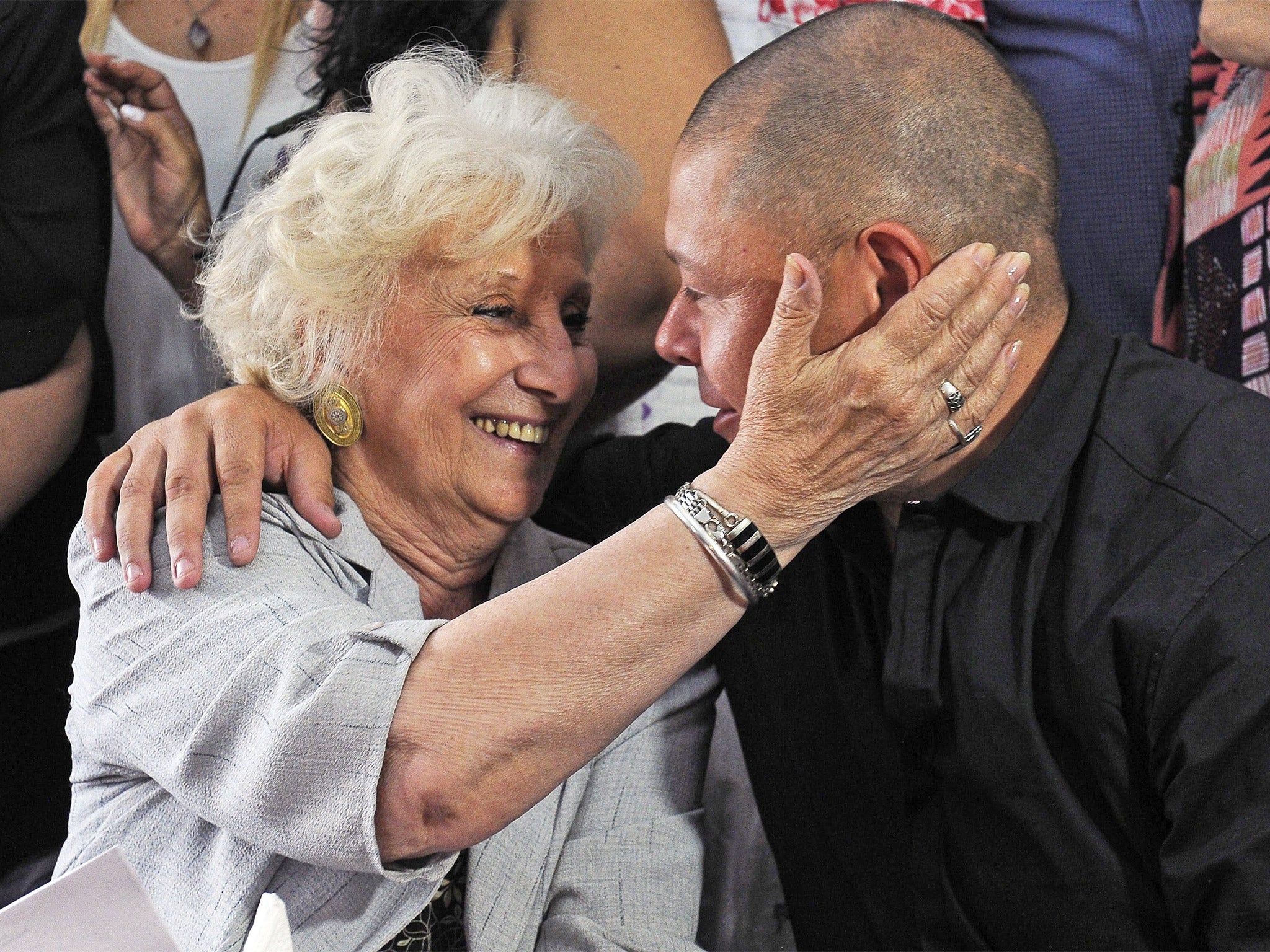Mario Bravo: Argentine man snatched from mother at birth meets her 38 years on thanks to Grandmothers of the Plaza de Mayo
Organisation that identifies children believed to have been kidnapped during the years of the junta regime and reuniting them with their grandparents, celebrates bringing a mother and son back together for the first time

Your support helps us to tell the story
From reproductive rights to climate change to Big Tech, The Independent is on the ground when the story is developing. Whether it's investigating the financials of Elon Musk's pro-Trump PAC or producing our latest documentary, 'The A Word', which shines a light on the American women fighting for reproductive rights, we know how important it is to parse out the facts from the messaging.
At such a critical moment in US history, we need reporters on the ground. Your donation allows us to keep sending journalists to speak to both sides of the story.
The Independent is trusted by Americans across the entire political spectrum. And unlike many other quality news outlets, we choose not to lock Americans out of our reporting and analysis with paywalls. We believe quality journalism should be available to everyone, paid for by those who can afford it.
Your support makes all the difference.As a baby Mario Bravo was snatched from his mother in an Argentinian jail so fast that she never knew her child’s sex. This week, Mr Bravo, now 38, was returned to his mother in the latest success of the Grandmothers of the Plaza de Mayo which has fought for years to reunite families torn apart by the Dirty War.
As Argentina watched agog, Mr Bravo appeared at a press conference in Buenos Aires and announced that thanks to the grandmother’s organisation he had just come from a first meeting with the mother he had never before had the chance to know.
The interest in the case is intense. The grandmothers have been focused primarily on identifying some 500 children believed to have been kidnapped during the years of the junta regime and reuniting them with their grandparents; Mr Bravo had been designated grandchild No 119. The mothers or their fathers are assumed to be among the roughly 30,000 Argentines who were “disappeared” by the junta.
“A child has never been reunited with his mother,” Mr Bravo told a radio station in Santa Fe province, where he was placed as an infant with a family sympathetic to the generals at the time and where he still lives today. “Sadly everyone has found [their parents] dead due to state terrorism. Uncles have met nephews and grandsons with grandmothers, but never mother and son.”
While some of the women were already with child when they were lifted from the streets to be interrogated, others became pregnant after being raped behind bars. But once the babies were born they were routinely taken away. Many grew up not even aware they were being raised by adoptive parents.
Some of the details in the case of Mr Bravo are still missing. But it appears that his mother, identified only as Sara, was seized one evening as she returned home from work and taken to the Urquiza Villa detention centre in Buenos Aires. She was released two years later and dumped at the edge of a sugarcane field, but not before she had given birth while in detention and seen her baby removed.
She told Mr Bravo this week that the instant she had given birth, her captors put a hood over her head. She could hear him cry but couldn’t see him. Or know if he was a boy or a girl. When she was released, she was warned to keep silent about her experience or face additional pain and punishment. She already had two daughters when she was first imprisoned. She had four more children after her release.
She brought her case to the grandmothers in 2007 and submitted blood and DNA samples in the hope that one day someone would come forward and make a match. That happened finally, when Mr Bravo acted on the suspicions he had long held about the story of his upbringing. He submitted a blood sample in August this year. It was cross-referenced with Sara finally on 19 November.
“This comes to show that we need to have faith in ourselves and in the other,” the founder and president of the grandmothers’ group, Estela de Carlotto, said, sitting beside Mr Bravo at the press conference. “We cried a lot,” he said of the moment that he and his mother finally were brought together.
“We are talking about 38 years of searching… It was a miracle. She heard my wail [as a newborn] and now she is hearing my voice 38 years later.”
He noted that he also suddenly finds himself not just with a new mother but with six siblings he never knew existed not to mention a whole gamut of new nieces and nephews. “This Christmas is going to be really expensive,” Mr Bravo joked.
Join our commenting forum
Join thought-provoking conversations, follow other Independent readers and see their replies
Comments